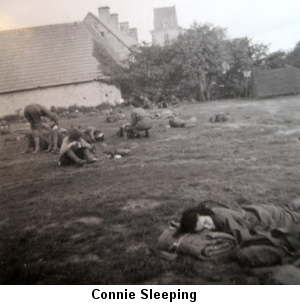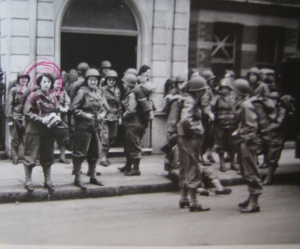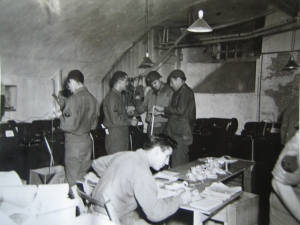Connie Hennig – US Army
By Dan Cavanaugh
 One of the first 300 woman on Omaha Beach – D-Day plus 90 at the SHAEF — Supreme Headquarters American Expeditionary Forces
One of the first 300 woman on Omaha Beach – D-Day plus 90 at the SHAEF — Supreme Headquarters American Expeditionary Forces
Enlisting
And I went to the Waves first. Because we had a summer home at the beach, Narragansett Bay. I thought, “I’m going to get in the Coast Guard or the Wave.” They were both all closed. What I mean is they were — the enlistments, they weren’t accepting any more that day. So I went right next door to the Army, signed up. (it should be noted no WAVES saw overseas action. By joining the Army Connie met her husband, was one of the first 300 woman on Omaha Beach, saw and has a picture of the first buzz bomb launched at England and served he country proudly). God had it all planned and I accepted all of them.
Voices like Angels
‘ You had mentioned that the Germans used to sing you to sleep’.
Connie: Oh! That was so beautiful. I — after we talked, I went to bed and I was thinking — it was — it was like angels. They sounded like angels. Their voices were high-pitched, all tenors. But they — what is it that I want to say? They harmonized. And all the Germans that I’ve heard sing harmonized. And their songs, I wish I had known the words. They were so beautiful, it was like angels singing. And that’s how I went to sleep. They were in the compound and you weren’t even allowed to look at them. I had to walk by them several times a day. Because in that area, we were in tents. And it was muddy, it was Boulogne, France. I had to go by them. And of course they weren’t allowed to say anything to us. And they didn’t. But they were so young. They were so young. They were 18, 17. But they wouldn’t sing during the day, just at night. I guess that kept them — whatever songs they were singing were good for them. But we all said the same thing. There are seven girls in my tent. We all said the same thing. How can so much beauty come out of so much hate? It was. It was just — that’s special time in my life. I’ll never forget that as long as I live. The first time I heard it, I was coming back from the shower. And it was getting dark. They always started just at evening. It must be, like, their religion, that when the sun went down, they started singing. And they didn’t stop. They sang all night long. I never understood why. We never questioned anything about the prisoners. You just didn’t talk about the prisoners. But it really affected me. Less voices, but still singing. Still singing, and in the morning, when the sun came up, it was quiet. And I never heard any fighting going on. It was close enough that if they had a riot or anything, we would have heard. But they all — I did look, you know. And they all looked scared to death. You know, it’s like they’re there and I’m here and what are we all doing here? And why do I hate you and, you know? It was a sad time. It was really a sad time.
Meeting folks from her hometown:
 I was from Thundermist Rhode Island. A real small town. But then this other girl that I went to school with, this was in the paper, too. Both of us met over there. See, we were being lined up for something. She didn’t end up being with me through the whole thing. But my last name was Pellequin with a P and hers was Messier so the alphabet — so we were in line. And she was behind me. See? Or behind me, M? Probably in the front of me. And I couldn’t believe it that I met her in the line. Then she went to Japan, see? And I went to Europe. And she was a good friend. Now that I talk about it, it was all planned. It just was all planned. I lost a lot of friends.
I was from Thundermist Rhode Island. A real small town. But then this other girl that I went to school with, this was in the paper, too. Both of us met over there. See, we were being lined up for something. She didn’t end up being with me through the whole thing. But my last name was Pellequin with a P and hers was Messier so the alphabet — so we were in line. And she was behind me. See? Or behind me, M? Probably in the front of me. And I couldn’t believe it that I met her in the line. Then she went to Japan, see? And I went to Europe. And she was a good friend. Now that I talk about it, it was all planned. It just was all planned. I lost a lot of friends.
Norman Herbert – best friend from home
When I was in France. And there was, coming down the Champs-Elysees, was Norman Hebert, a classmate. I used to see him with my sisters. They were best friends. We lived close to — it was a French area. We lived close to each other. I knew him enough that we were close. Not boyfriend/girlfriend. When he said my name, it was unbelievable. I couldn’t believe it was him. He looked so horrible. He had the black and white prison garb on. My husband didn’t know him. I was standing there. It was a friend there, Karl was. He said, “Do you know him?” I said, “Yeah. He’s from my city, my little town.” And I went over to him. And of course we hugged each other. I said, “Norman?” He said, “Yeah. I got shot down right after I came over here. I’ve been in” — God, which one was he in? That was the day that the prisoners that could walk were — they wanted to do it. When you walked up the Champs-Elysees, the flags were hanging. They had just put them back up when all the prisoners were released. It has the American, the English, the Russian, there were four flags up there, France.
Yeah, I don’t remember what I did with it. See, after that came the victory. They called the victory. But the flags were put up right way. That’s the way the French people were. That was going to be the end of the war. They were a big part of in Paris. The Germans took Paris over, all of it. But, so anyhow, they went to the concentration camps and all the prisons and released all those people. There were some people that couldn’t walk. They were taken to hospital. Norman told me that his — all he could think of when he was being released was that he wanted to walk up the main avenue to the Arc, and he was doing it. And we went with him the rest of the way, see, Karl and I. It was some day. I can see it so clearly. All those people in black and white stripes coming up that huge boulevard. I think that was, at that time, that was a lot for me. Six lanes. They were marching up towards that arch. And they, some of them could barely walk. Some of them were so intent on walking that they had someone else help them walk. But there was Norman. I never forget that. That was — but I didn’t, at that time, I didn’t think it was that big. But then as time went on and I thought, he survived. Thank God he survived. Because he had a big family, there were three sisters, and I think there were two brothers. They were a good family. But will he ever get over that? You know. That’s what I thought of. And he wouldn’t talk about it. Because we tried to get something out of him. He said, “I don’t want to talk about it.” He looked absolutely awful. Cheekbones were way in. His hair was — he was 24. His hair was completely white. Completely white. And he smoked. And my husband asked him, it wasn’t my husband then. He asked him, “Do you want some cigarettes?” He said, “Oh, yeah.” We took him to our PX and we got him cigarettes. See, we could buy them, but you were only allowed a carton at a time. I didn’t smoke. So I got him one. My husband got him one, too. We gave it to him. What happened to him after that? I know he had to go to a hospital. Yes. He had to have care before he went home. I know my brother wrote months later and said that he was home. That he had come home. He said, “I’m going to make — I’m going make it.” That’s what he said. “I’m going to make it, Connie. I’m going to make it. I made it all this time. I’m going to make it.” But I didn’t question him. I thought that was not the time to question him.
Meeting another local Girl and Making the Rubber Tanks for the Invasion back home (Reading from a newspaper clipping): It says we were, yeah, we were billeted in London. Living within a few blocks of each other before we enlisted. Mary Hasmond and I had never had met previously. Sent to London on Wac duty recently. They were assigned to the same room. Almost at once, Sergeant Herman began to read a copy of “The Providence Journal,” which was a part of Winsocket, too, sent to her by her parents. And I said, “Are you reading my hometown paper?” Their homes were within five minutes’ of walk to each other. And that’s in here. I was in England since April. She was in the hospitalization branch. The chief surgeon’s office in there. Everybody worked for the war before we went in, too. I was — oh, the most important thing I wanted to tell you that you would — this would be something. I worked in Winsocket. And I worked for the rubber company which made the rafts. One day we got an order, and it was different. It was just that we were making big pieces. We weren’t to question it, just do it. And so we did it. When I got overseas and started working for the top secret, for the invasion, I’m sure you’ve heard about this. We wanted to fool the Germans, so we pretended we were going to have another area to launch. So we made rubber tanks and trucks. And I was working on the things that I made in Winsocket. Top secret. I mean, you didn’t even go home. You slept at the office. And we get this notice that there’s going to be — I forget what they called it — launch from such and such, but it’s not going to be real. It’s going to make the Germans think we’re leaving this area. But we weren’t. We were going to land in Normandy and from that, they thought we were going to land up further at the Sherberg. That was something that I couldn’t believe. And there was a code. That’s right. There was a code that we used at the rubber place, and I saw the code on the pictures that they had for the tanks and the trucks. That — that blew my mind. And I couldn’t tell anybody. I couldn’t write to my parents and tell them.
Into Paris:
 And after — when we got into Paris, we rode from the beach in a touring — like a — I was in a touring car. And they — we went through an area that you actually could smell death. It was the, what’s the forest that they — the Ardennes Forest? Nobody spoke. I mean, it was like, you could tell that there had been big, big holes. But everything was cleaned up. But there was something about that place that I’ve never forgotten. It was like, nobody spoke. We didn’t talk in the car. And nobody talked about it after. But that was supposed to be one of the biggest battles they had getting into France after leaving the beach. And the — when we got into Paris, there was snipers everywhere. They hadn’t rounded them up. We weren’t — they took us into what was called the California Hotel. And it was just the women. And we were not allowed out at all for three days. Because there were too many snipers left. And I watched them — when we finally — our office was in another section of Paris, it was near the Arc de Triomphe. My office was next door to that. And we had to walk there. And trying to think. Oh, we had a soldier with us. That’s right. We had a man with us. He took us to work. And then sometimes we worked all night. And we had a guy to come home for the first few weeks until they were sure that all the Germans were out of there. But I did see them shave women’s hair, because they were collaborating with the Germans. And they were shaved right down to the skull. And nobody — they took their life in their hands even being out. And then I guess they got wigs or whatever. I don’t know.
And after — when we got into Paris, we rode from the beach in a touring — like a — I was in a touring car. And they — we went through an area that you actually could smell death. It was the, what’s the forest that they — the Ardennes Forest? Nobody spoke. I mean, it was like, you could tell that there had been big, big holes. But everything was cleaned up. But there was something about that place that I’ve never forgotten. It was like, nobody spoke. We didn’t talk in the car. And nobody talked about it after. But that was supposed to be one of the biggest battles they had getting into France after leaving the beach. And the — when we got into Paris, there was snipers everywhere. They hadn’t rounded them up. We weren’t — they took us into what was called the California Hotel. And it was just the women. And we were not allowed out at all for three days. Because there were too many snipers left. And I watched them — when we finally — our office was in another section of Paris, it was near the Arc de Triomphe. My office was next door to that. And we had to walk there. And trying to think. Oh, we had a soldier with us. That’s right. We had a man with us. He took us to work. And then sometimes we worked all night. And we had a guy to come home for the first few weeks until they were sure that all the Germans were out of there. But I did see them shave women’s hair, because they were collaborating with the Germans. And they were shaved right down to the skull. And nobody — they took their life in their hands even being out. And then I guess they got wigs or whatever. I don’t know.
Reflections:
I can still see this young soldier, he was trying not to look at me. But I looked at him. We didn’t say anything. I wasn’t allowed. But I felt so sorry for him to be in such a situation where he had a mother and father and maybe brothers and sisters and this hell hole and — that’s never left me. I just — that’s why when I hear about wars, it’s so useless. It’s so useless. The — but he was blond. Little German look on him. You know, that blondish. It’s like he was looking and saying, “Yeah, why?” You know? And that’s the way I felt. Why? Why are they all here? Then they changed. They would take them out somewhere else, and then we would get more in. They were getting a full front there. And so that the young, that was a sad, sad thing. That stands out in my mind, I think, more than anything that — we was cold, and we didn’t have food, and — my husband then was a sergeant. He somehow got blankets for us. Because we only had one blanket. But coming back to those young fellas, I even thought about them. Where do they sleep? You know, they were all standing in bunches. And I didn’t see any, any barracks. There weren’t any barracks. They were all standing in a compound. So that bothered me. I would — well, the other girls saw it, too. And I had one girl that was in my barracks, she said that, “War is hell, Connie. Look at those poor kids.” And yet, they were our enemy. They would have killed us the first chance they could have gotten.
 Our World War II Veterans
Our World War II Veterans